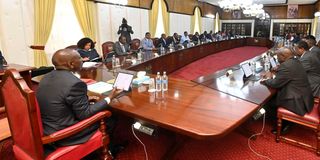No respite for struggling suppliers as pending bills soar

President William Ruto and Cabinet Sectaries during a past Cabinet meeting at State House, Nairobi.
Whenever governments are unsure of what to do about an issue, they form a committee or a task force to look into it. This is also the strategy of choice when the bureaucracy wants to kick a can down the road.
This was reinforced for me two years ago as we sought the certification of a Nyahururu-made tut tuk, the BJ50. The matter involved the Kenya Bureau of Standards, the Kenya Revenue Authority, the National Transport and Safety Authority , Laikipia County government and the chief mechanical engineer.
We formed a powerful-sounding multi-agency task force chaired by a principal secretary, but that is a story for another day. Today, pending bills and a special Cabinet committee.
Some media reports celebrated the formation of that special Cabinet committee last week as “light at the end of the tunnel for businesses”.
The committee is to audit the more than Sh537 billion that the national government owes contractors and suppliers. More nuanced reports noted there was no relief in sight, given that businesses will have to wait for more than one year.
Counties owe another Sh160 billion, bringing the total owed by governments to nearly Sh700 billion, about six per cent of the gross domestic product.
With a combined annual procurement in excess of Sh1.8 trillion, no business can ignore the government. But it does require formality and very serious discipline around procurement, where many problems occur.
The media have been awash with stories of financial ruin of small and mid-sized businesses that have supplied government and have not been paid.
When non-performing loans (NPLs) edge up, such delayed or non-payment is seen as a big contributor. But the very high and rising interest rates are also no doubt squeezing profitability.
IMF programme
The special committee is not the first effort to resolve pending bills. Three years ago, the State Department for Roads and Public works proposed a bond to settle the more than Sh150 billion that the road agencies owed to contractors then.
Unfortunately for the contractors, Kenya was about to get on to an IMF programme, and the latter were opposed to such a bond.
In addition, there was quite strong negative sentiment against new public debt. The matter remains unsettled to date. Many contractors, faced with severe cash constraints, have all but abandoned sites.
Counties’ bills are by far the smaller portion but receive more air time, with the Independent Electoral and Boundaries Commission, the Summit, Parliament, Treasury, Controller of Budget all weighing in at various times. With so many voices, it is no surprise county bills dominate media coverage.
At both the Intergovernmental Budget and Economic Council (IBEC) and the Summit, pending bills have been a regular agenda going back to the 2018/19 financial year, when both organs requested the Auditor-General to verify the pending bills at that time, and to include everything since devolution started.
The office of the Auditor-General completed the exercise within a few months. About half of the pending bills were found to be ineligible for payment – at least legally. The reasons varied, but poor procurement and lack of documentation was by far the leading cause.
At the IBEC, the chair pushed each county to form a pending bills resolution committee to consider the handling of ineligible bills and give direction. A few counties did, but the committees were ineffective as, legally, they had no legs to stand on. No officer nor citizen, appointed to some ad hoc committee, could overrule the Auditor-General and declare the ineligible bills payable! The upshot was that not much progress was made.
At the Summit, it soon become clear that the pending bills problem is in part an accounting problem. Many projects run over several years. However, the public sector uses cash accounting. All the projects that are not complete and paid for by June 30 of each year must be reported as pending bills. Obviously, as the budgets grow larger, the amount not settled by June 30 also grows.
The Summit then directed the Public Sector Accounting Board to look into the accounting issue, with a view to transitioning to accrual accounting, which is seen as best practice. A date was set – March 2023 – by which time all public bodies should migrate to accrual. March has come and gone, but migration has not happened.
Cash-flow problem
The Summit also acknowledged that pending bills are mainly a cash-flow problem. At the county level, delayed disbursement of the equitable share leads to delayed payments to contractors. The national government is in control of both the taxation agency – Kenya Revenue Authority, and the Consolidated Fund. They use this loophole to prioritise national government cash needs at the expense of counties.
But even after jumping the equitable sharing queue, national government still falls behind in payments because it lacks fiscal discipline. Often promised, fiscal consolidation remains a mirage.
Further, when taxation raises less revenue than projected, which is often, expenditure plans are not scaled back immediately. By the time a supplementary budget (this year we had two) is presented late May or June, commitments have already been made, and there is no scope for scaling back.
@NdirituMuriithi is an economist.





